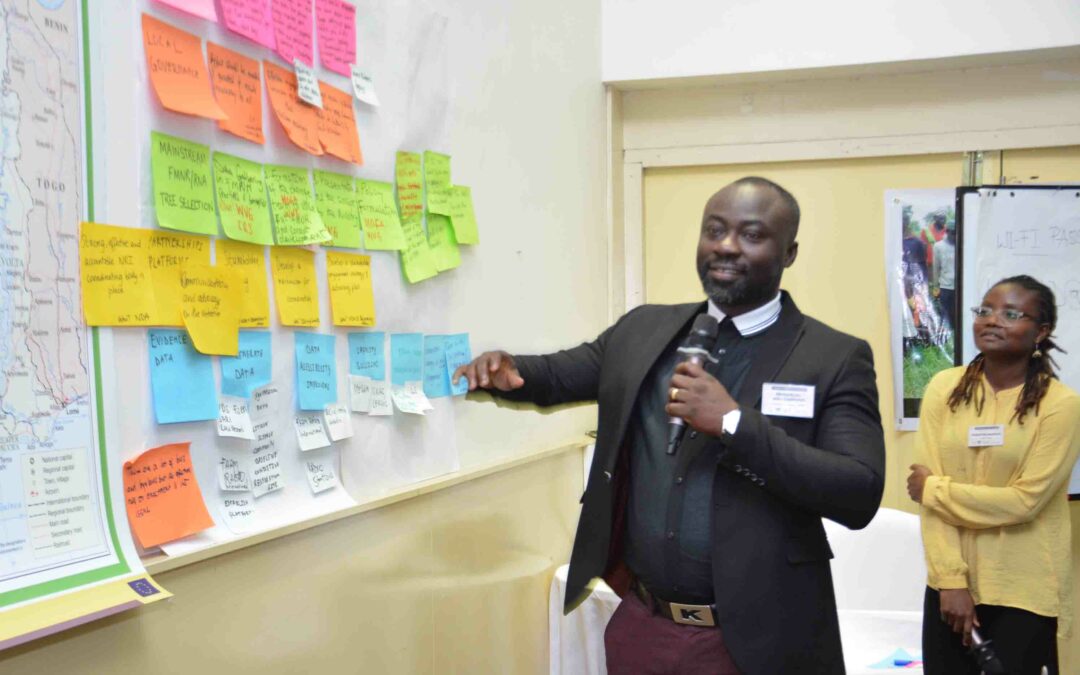By Emilie Smith Dumont
“Inclusive and evidence-based approaches to accelerating landscape restoration” was the theme of a two-day SHARED (Stakeholder Approach to Risk Informed and Evidence-based Decision-making) workshop held on the 21st and 22 October in Accra and organised by the Regreening Africa Project in Ghana implemented by World Vision Ghana and Catholic Relief Services and led by CIFOR-ICRAF (Centre for International Forestry Research and World Agroforestry) with funding from the European Union. The event brought together seventy one international, national and regional partners from government agencies, civil societies, farming communities and academic institutions. One of the principal objectives was to review the Regreening Africa Program successes and learning and discuss the implications of the evidence and experiences gathered during almost five years of project implementation in Bawku West and Garu Tempane in Upper East and in Mion district in the Northern Region of Ghana.
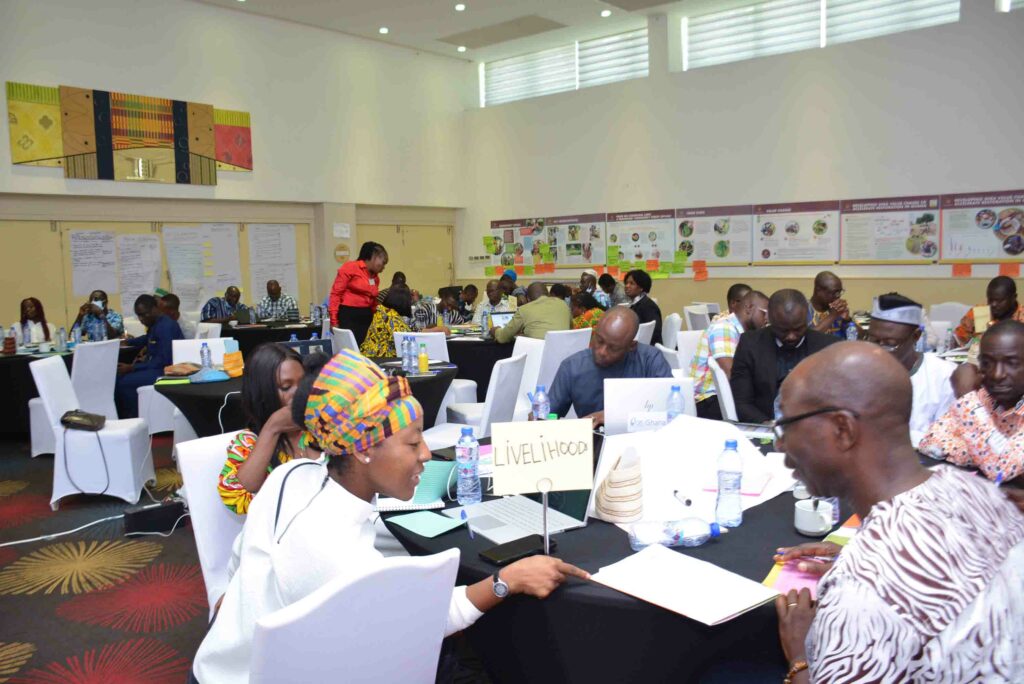 Participants at the SHARED event engage in a group discussion. Photo: World Vision Ghana
Participants at the SHARED event engage in a group discussion. Photo: World Vision Ghana
Since 2018, 69,783 farming households were reached and contributing to restore 218,852 hectares of land through scaling Farmer Managed Natural Regeneration (FMNR) and tree planting with over 200,000 seedlings planted cumulatively over the project span. The aim was to address pressing environmental and socio-economic challenges of the savanna zones and build resilience to climate change in communities and landscapes. This was done through training 12, 000 farmers and fire stewards in FMNR and bushfire management and over 15,000 framers in tree planting and management. These practices were also complemented, amongst others, by training on conservation agriculture, on beekeeping, on the construction and use of improved cook stoves in Mion and village saving technologies. Real time monitoring through the Regreening app was also introduced and is being used with partners to track restoration progress and promote citizen science and critical data collection.
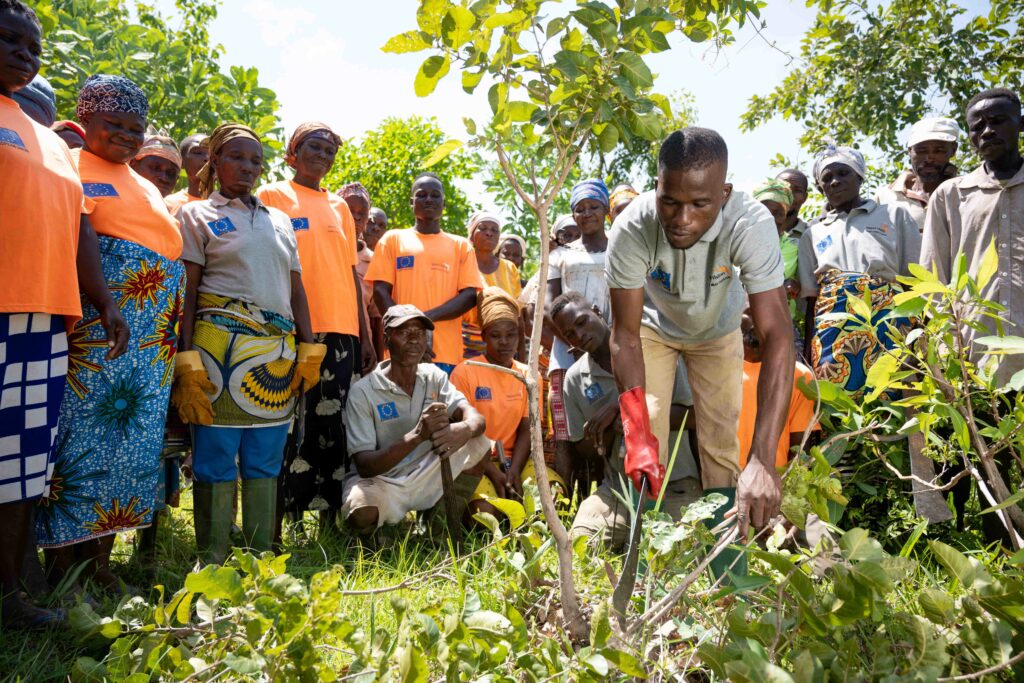 A lead farmer in Ghana demonstrates to community members how FMNR is carried out. Photo: Regreening Africa/Kelvin Trautman
A lead farmer in Ghana demonstrates to community members how FMNR is carried out. Photo: Regreening Africa/Kelvin Trautman
During the event, an evidence and experience wall interactive session provided an opportunity to share experiences on practices, policies, and science for land restoration in Northern Ghana and for community voices to be heard. John Anyagre a farmer from Bawku West District commented on the importance of the capacity building component of Regreening Africa’s program and stressed the need to sustain the work. He stated that “with the additional income from my tree nursery, I have been able to take care of my family” and “the Regreening Africa program has really helped the community to battle climate change.” The successful approaches of the project demonstrated in promoting FMNR for restoring community forests, enhancing local governance through the district environmental management committee in Mion, the innovative gender transformative actions, and shea value chains development were amongst the presentations that triggered important discussions amongst participants on how to sustain these efforts and to take them to scale in the future.
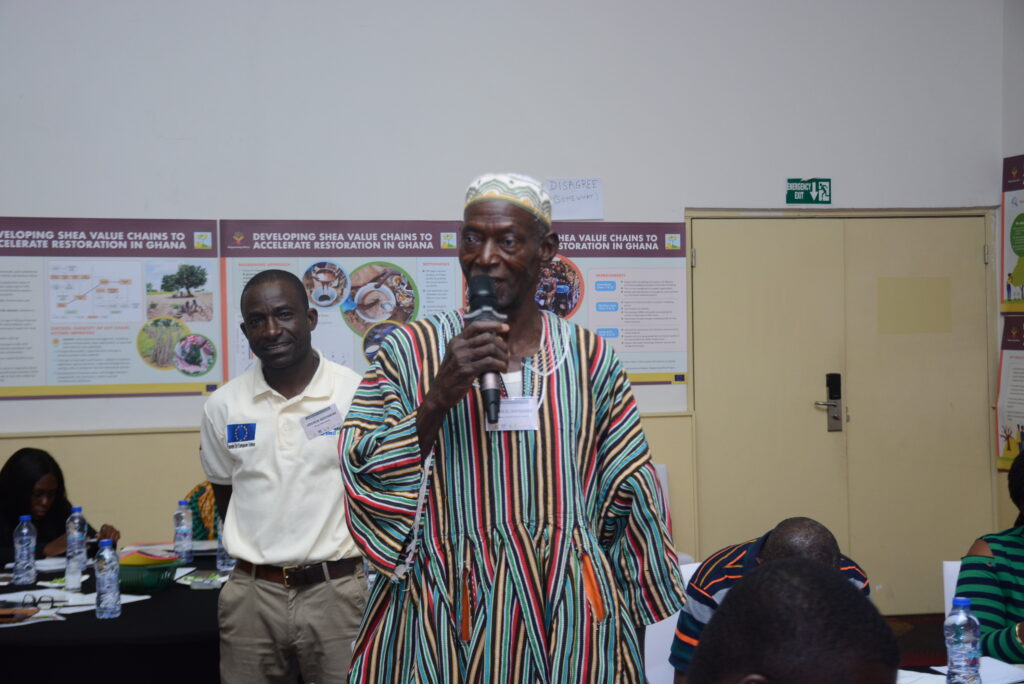
John Anyagre, a farmer from Bawku West District in Ghana at the SHARED workshop. Photo: World Vision Ghana
As Nyadia Sulemana Nelson, Deputy Chief Executive, Forestry Commission Ghana stated in his opening remarks: “The Regreening Africa SHARED event is so important as it allows stakeholders to share lessons learned and to bring best-practices to scale land restoration. The challenges of restoration are multiple and multi-faceted, and therefore require collaboration”.
Lessons for sustainability and laying the foundation for the Northern Restoration Initiative
Creating multi-stakeholder collaborative processes to share evidence and learning underpins the philosophy of the program and the approach deployed in Ghana notably to ensure the sustainability and scale the impact of the Regreening Africa project. “To effectively increase tree cover, restore land health and community resilience in Ghana, we all recognise there is an urgent need for strategies and policies that are aligned and coherent with the needs and objectives of the extensive and fragile savannah landscape in the northern part of the country” explains Edward Akunyagra, the project manager from World Vision Ghana, the lead implementing partner.
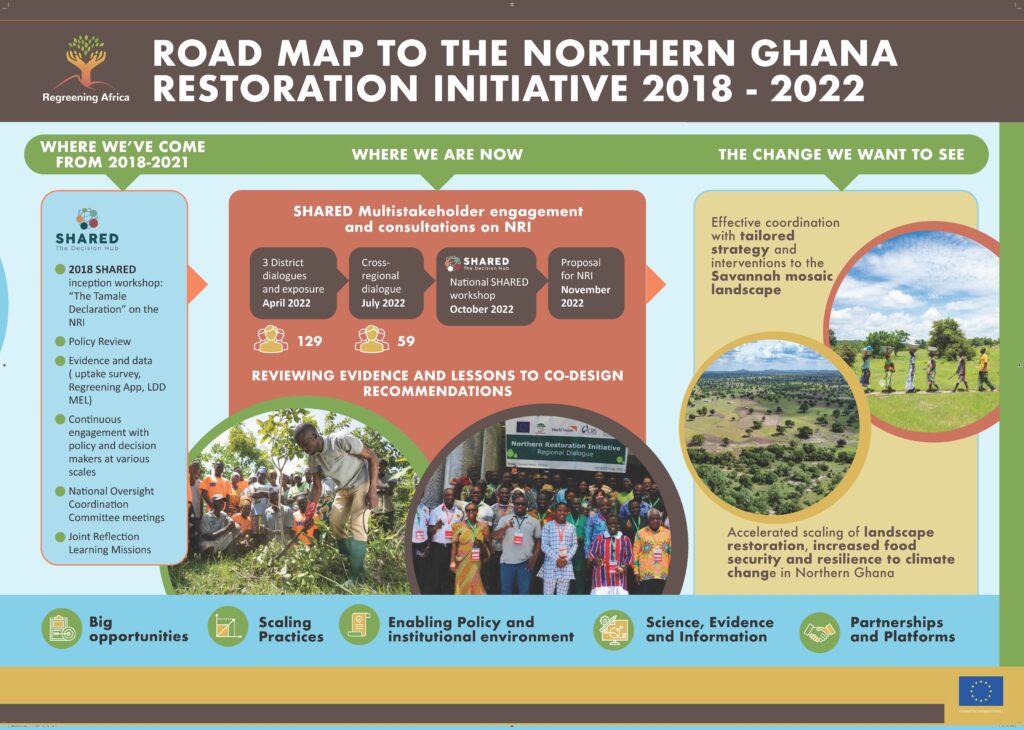
Building on the successful restoration experience of the project, the consortium facilitated a series of four multi-stakeholder dialogues and workshops at districts and cross-regional level in 2022 to design a vision and map outcomes for scaling land restoration and to jointly elaborate a set of advocacy recommendations for policies and practices that need to be in place. The National SHARED event held Accra was the occasion to consult key national actors, to refine the proposed strategy for the Northern Savanna landscape and to explore how ongoing efforts in Ghana can be linked for synergies. Five key outcomes were defined by stakeholders as priority for taking forward by the Northern Restoration Initiative supported with an actionable plan.
- Mainstreaming FMNR/ANR as an extension approach for land restoration in Northern Ghana with synergies across Forestry, Agriculture and Environment Departments and recommendations for tree selection and germplasm management to ensure best returns on investments.
- Supporting local livelihood, value chains and incentives for farmers looking at how to institutionalise support mechanisms at local level for example through the creation of tree village enterprises and by building networks with the private and financial partners.
- Empowering and sustaining local governance for land restoration of the savanna ecosystems which is critical for scaling land restoration and for ensuring inclusive benefits to communities, and where the district assembly and traditional chiefs play a key role in implementing and enforcing environmental by-laws.
- Improving access to evidence and data for informing decision making and for scaling land restoration necessary for design & planning but also monitoring and evaluation, tracking bushfire and land cover changes are important areas where gaps are constraining.
- Partnerships and platforms for the Northern Restoration Initiative to create and sustain well-coordinated, all-inclusive stakeholder participation across scales for sustainable landscape restoration for Northern Ghana.
The need for an efficient and sustainable coordinating platform was seen as not only cross-cutting but as the first essential step to achieve progress across the other outcomes and bridge policy and knowledge gaps. “There is an important momentum on the NRI, says Tontie Binado but how do we take this initiative off the ground? How do we mobilise commitments and investment? This is what a small task force of volunteers have committed to further discuss, to make connections with existing projects, to review opportunities and synergies and look for champions. For chief Santaro a traditional leader from Moin District: “you can navigate through all challenges of restoration when you include all stakeholders. There’s a better chance of succeeding when you have partnerships. The idea of a Northern restoration initiative (NRI) by 2030 is realistic but involves a lot of work. Commitment and consistence. You need all key players together.” The next steps will be to consolidate and refine the theory of change and to enhance the NRI strategy and the communication and advocacy plan in the coming months.
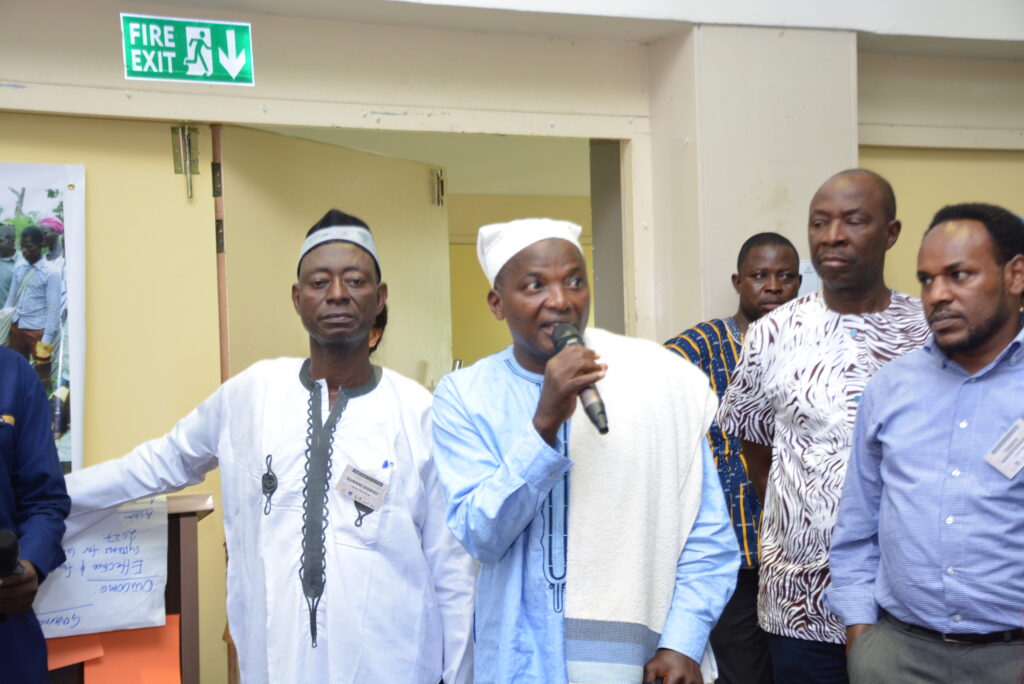 Chief Santaro, a traditional leader from the Moin District in Ghana, shares his views at the SHARED workshop. Photo: World Vision Ghana
Chief Santaro, a traditional leader from the Moin District in Ghana, shares his views at the SHARED workshop. Photo: World Vision Ghana
For more information on the workshop, including the workshop report and resources please follow this link.
This story was produced with the financial support of the European Union. Its contents are the sole responsibility of Regreening Africa and do not necessarily reflect the views of the European Union.

